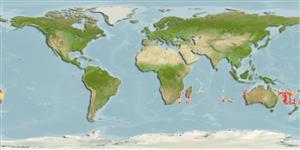Teleostei (teleosts) >
Ophidiiformes (Cusk eels) >
Ophidiidae (Cusk-eels) > Neobythitinae
Etymology: Epetriodus: Greek, ep, epi = over, high +Greek, tri = three + Greek, odous = teeth.
Eponymy: Norman Bertram ‘Freddy’ Marshall (1915–1996) was an ichthyologist and marine biologist at the BMNH (1947–1972). [...] (Ref. 128868), visit book page.
More on authors: Cohen & Nielsen.
Environment: milieu / climate zone / depth range / distribution range
Ecology
Marine; bathydemersal; depth range 1000 - 1750 m (Ref. 4103). Deep-water; 18°S - 35°S
Indo-West Pacific: off East Africa to New Caledonia.
Size / Weight / Age
Maturity: Lm ? range ? - ? cm
Max length : 21.5 cm SL male/unsexed; (Ref. 34024)
Short description
Identification keys | Morphology | Morphometrics
Dorsal spines (total): 0; Dorsal soft rays (total): 95 - 98; Anal spines: 0; Anal soft rays: 74 - 77. Body relatively short; eye diameter much shorter than snout, mouth ends well posterior to eye; many needle-like teeth; short, sharp opercular spine, preopercle unarmed; 2 median basibranchial tooth patches (Ref. 34024).
A benthic species found on the continental slope (Ref. 75154). Uncommon species (Ref. 34024). Reproductive strategy possibly similar to other members of this family featuring oviparity, with oval pelagic eggs floating in a gelatinous mass (Ref. 205).
Life cycle and mating behavior
Maturity | Reproduction | Spawning | Eggs | Fecundity | Larvae
Nielsen, J.G., D.M. Cohen, D.F. Markle and C.R. Robins, 1999. Ophidiiform fishes of the world (Order Ophidiiformes). An annotated and illustrated catalogue of pearlfishes, cusk-eels, brotulas and other ophidiiform fishes known to date. FAO Fish. Synop. 125(18):178p. Rome: FAO. (Ref. 34024)
IUCN Red List Status (Ref. 130435: Version 2024-1)
Threat to humans
Harmless
Human uses
Fisheries: of no interest
Tools
Special reports
Download XML
Internet sources
Estimates based on models
Preferred temperature (Ref.
123201): 3.4 - 5.2, mean 4.3 °C (based on 94 cells).
Phylogenetic diversity index (Ref.
82804): PD
50 = 1.0000 [Uniqueness, from 0.5 = low to 2.0 = high].
Bayesian length-weight: a=0.00110 (0.00040 - 0.00297), b=3.08 (2.85 - 3.31), in cm total length, based on LWR estimates for this (Sub)family-body shape (Ref.
93245).
Trophic level (Ref.
69278): 3.5 ±0.6 se; based on size and trophs of closest relatives
Resilience (Ref.
120179): Medium, minimum population doubling time 1.4 - 4.4 years (Assuming tmax>3).
Fishing Vulnerability (Ref.
59153): Low vulnerability (16 of 100).
